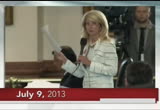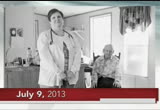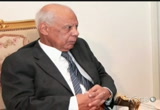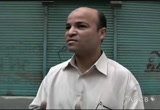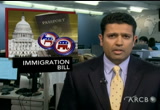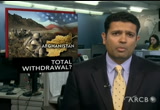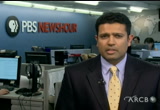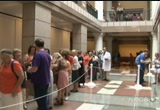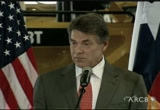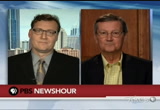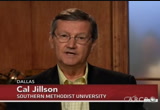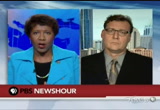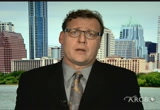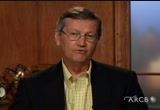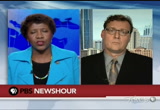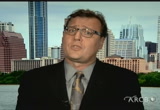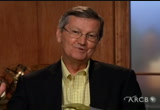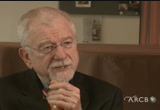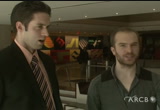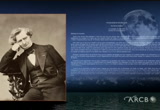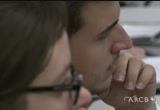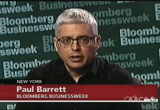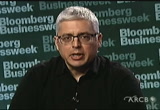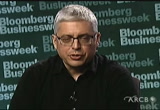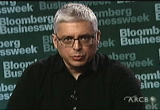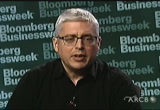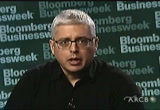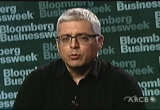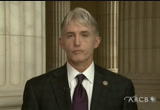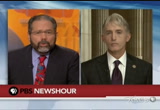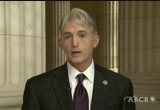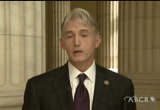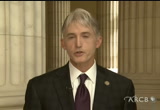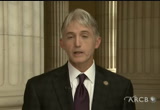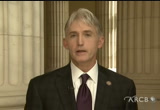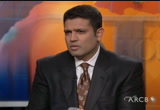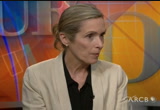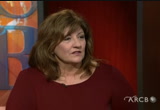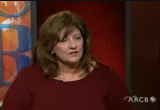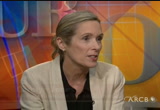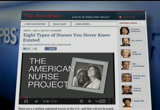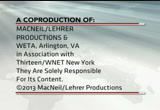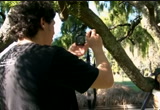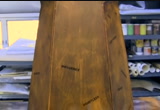tv PBS News Hour PBS July 9, 2013 10:00pm-11:01pm PDT
10:00 pm
captioning sponsored by macneil/lehrer productions >> woodruff: egypt's military leaders tapped a new prime minister today and laid out a six-month roadmap to return to civilian democracy, but the muslim brotherhood vowed to oppose the timetable. good evening. i'm judy woodruff. >> ifill: and i'm gwen ifill. on the newshour tonight: we get the latest on the interim government's plan for new elections and an amended constitution on a day of relative calm in egypt. >> woodruff: then, we turn to politics of the lone star state, where both republicans and democrats suddenly see fresh opportunities. >> ifill: paul solman reports on performing artists learning the basics of business in order to
10:01 pm
survive in a tough economy. >> can you make a living these days as a musician without significant entrepreneurial effort? >> i don't think so. so, how do you balance, you know, doing marketing for yourself and all these other things and still keeping up your art form? >> woodruff: we update the legal wrangling over settlement claims stemming from the 2010 gulf oil spill. >> ifill: we continue our conversations about immigration reform as the house steps up to the plate. ray suarez talks with south carolina republican trey gowdy. >> woodruff: and hari sreenivasan looks at a new book that captures the stories and images of nurses on the frontlines of health care all across the country. >> pelley: >> they take your blood pressure and your temperature. but i didn't know about all different kinds of nurses and everything that they do and how many different ways they touch our lives. >> woodruff: that's all ahead on tonight's newshour. >> major funding for the pbs newshour has been provided by:
10:02 pm
♪ ♪ moving our economy for 160 years. bnsf, the engine that connects us. >> the william and flora hewlett foundation, working to solve social and environmental problems at home and around the world. >> and with the ongoing support of these institutions and foundations. and... >> this program was made possible by the corporation for public broadcasting. and by contributions to your pbs station from viewers like you. thank you.
10:03 pm
>> woodruff: the interim leadership of egypt took shape today, and there were new pledges of outside aid to help the battered economy. it all came a day after more than 50 islamist protesters died in a clash with troops. >> reporter: midday prayers. muslim brotherhood supporters are distraught after 51 of their number were killed by soldiers near here yesterday. they said the violence outside an army barracks has reinforced the country's battleground. >>. >> ( translated ): mohamed morsi is my president. i will become a martier like the people who consider killed yesterday. >> reporter: in the wake of the killing, adly mansour, the interim president, laid out a timetable for amended the egyptian constitution and electing a parliament and president. a top brotherhood cleric
10:04 pm
denounced the timetable. >> ( translated ): we do not recognize this military coup or whatever came as an aftermath of it therefore there is no need to speak about any decrees because they were issued by people without authority. rough rauf spokesman for egypt's foreign ministry brushed aside the objections. he insisted the army will have no political role in the future and he argued that leaving morsi in power would have lead to calamity. >> without the intervention by the army forces, it could have a disastrous scenario, including a possible wide range of civilian rule or conflicts among the two parts of the society. >> woodruff: mansour also appointed the prime minister today, an economist, social democrat, and supporter of the 2011 revolution. the job was originally set to go
10:05 pm
to former diplomat and nobel laureate mohammed elbaradei but objections from hard-line islamists scuttled that move. instead, elbaradei was named a vice president today. a short time later, state t.v. broadcast a statement from the military chief who engineered morsi's removal. the general said the so-called road map laid out by the military gave "a specific timetable for every step of the rebuilding of the constitution in a way that will guarantee and achieve the will of the people. and that means a landmark to the path are determined and clear." some in cairo voiced hope that the move will help end the violence. >> ( translated ): by the end of this year, we must have a president, a parliament and a finished constitution so that we can overcome the divided situation that we have on the
10:06 pm
streets right now. >> woodruff: in washington, there was tentative praise from white house spokesman jay carney. >> we are cautiously encouraged by the announcement by the interim government that it has a potential plan for moving forward with a democratic process and elections, both parliamentary and presidential and we think that's a good thing >> woodruff: so far, the obama administration said it will maintain u.s. aid to egypt. and in a bid to bolster egypt's economy, saudi arabia and the united arab emirates announced today a total of $8 billion in assistance. >> ifill: still to come on the newshour: political intrigue in the lone star state; artists who are also entrepreneurs; the b.p. settlement dispute; the immigration debate goes to the house; and portraits of american nurses. but first, with the other news of the day, here's hari sreenivasan.
10:07 pm
>> sreenivasan: democrats in congress issued a warning to house republicans today on immigration reform. they insisted they will not accept any bill unless it provides a path to citizenship for 11 million people living in the u.s. illegally. the bill that passed the senate last month does just that. but in the house, speaker john boehner said the senate measure is still weak on what he considers the most fundamental point. >> the first big step that you have to have is serious border security because without serious border security what you're going to end up with is the same thing we saw after the 1986 act. and so we're going to -- we believe that a common sense step by step approach is the right way. we've talked about it for months. >> sreenivasan: house republicans are working on four separate bills, but none offers citizenship. boehner has said the house will not consider the senate bill, but senate majority leader harry reid said the pressure is building. >> he is saying the bipartisan
10:08 pm
bill that we've done he is not going to touch that. well, we're going to continue to press. the american people, the vast majority of the american people-- democrats and republicans-- support what we did. >> sreenivasan: we'll have more on immigration later in the program tonight. the death toll has risen to 15 in saturday's fiery train wreck in canada. officials said 50 people are still missing in the small town in quebec. they also announced they've opened a criminal investigation into what caused the wreck but gave no details. canada's largest city tried to dry out today after nearly four inches of rain triggered flash floods last night. the severe storm that hit toronto left at least 300,000 people without power. the city's downtown core was dotted with cars that people abandoned as the water rose. the subway system was also swamped, with many metro stations under water. one double-decker commuter train stalled in the flood, trapping
10:09 pm
about 1,400 passengers during the evening rush hour. in arizona, thousands of people gathered in prescott valley to honor the 19 firefighters who were overrun and killed by a wildfire last month. photographs of the elite firefighting crew were on display in a packed arena. firefighters from across the country looked on as vice president joe biden praised the victims as men of "uncommon valor." >> i believe they animate our national identity, and i believe america will continue to be defined by the example of the 19. 19 ordinary men who did extraordinary things. >> sreenivasan: the yarnell hill fire is now 90% contained, and evacuation orders have been lifted. there's new talk that president obama might pull all american troops out of afghanistan by the end of 2014 instead of leaving a small security force. the "new york times" reported today the president is increasingly frustrated in his
10:10 pm
attempts to deal with afghan president hamid karzai. a white house spokesman said the "zero option" is on the table, but no decision is imminent. the people of pakistan today digested new details on how osama bin laden managed to live there for years undetected. we have a report narrated by from kylie morris of independent television news. >> reporter: two years after america's stealth raid on the abbottabad compound that killed the al qaeda leader, an independent commission in pakistan has raked through testimony to uncover more detail of how the bin ladens lived and examine the role played by both pakistan and the u.s. its report, published online by al jazeera, is scathing in its criticism of pakistan's security and government apparatus, who failed to detect the world's most notorious terrorist for nine long years. it describes complacency, inefficiency and negligence within the military and the country's main intelligence agency, and intones:
10:11 pm
>> how the entire neighborhood, local officials, police and security and intelligence officials all missed the size, the strange shape, the barbed wire, the lack of cars and visitors over a period of nearly six years beggars belief. >> reporter: the police get special mention. it was a hapless policeman, after all, who, in 2003, stopped a car in a bazaar in the swat valley for speeding. inside the car, the bodyguards and family of osama bin laden, as well as the man himself. according to one of his bodyguard's wives: >> her husband very quickly settled the matter with the policeman, and they drove on. >> reporter: she says bin laden was cleanly shaven at the time. american drones had filmed the sheikh wearing white robes in afghanistan in 2000. by the time he'd escaped to abbotabad, he'd developed a taste for hats. according to the account given by his wives, bin laden wore a >> cowboy hat, apparently to avoid detection from drones above. whenever he was feeling sluggish, he would take some chocolate with an apple.
10:12 pm
>> reporter: osama himself seems to have performed the role of many a grandparent: assisting in the care of his grandchildren. but there were no play dates. the families lived in virtual isolation throughout their six years, until the americans came calling. the report's authors accuse the americans of behaving like criminal thugs. it calls the may 2nd attack on the compound an act of war which illustrates its arrogance. >> sreenivasan: today, the nominee to be f.b.i. director touted the virtues of phone and internet surveillance in fighting terror, but james comey also told his senate confirmation hearing he will work with congress on improving laws that govern surveillance. comey served in the justice department under president george w. bush. he said he argued strongly against extreme interrogations of terror suspects but was overruled. three young women who spent a decade imprisoned and tortured in a cleveland house have made their first public statements. the women escaped from the house and their kidnapper in early may. in an online video today, they thanked those who have given
10:13 pm
them emotional and financial support, and they asked for privacy. michelle knight, now 32, said she will not let her long ordeal define her life. >> i just want everyone to know i'm doing just fine. i may have been through hell and back but i am strong enough to walk through hell with a smile on my face and with my head held high. >> sreenivasan: the accused kidnapper, ariel castro, is facing trial on 329 counts of kidnapping, rape and aggravated murder. on wall street today, the dow jones industrial average gained 75 points to close at 15,300. the nasdaq rose 19 points to close at 3,504. those are some of the day's major stories. now, back to gwen. >> ifill: when it comes to "red states," it doesn't get much redder than texas. republicans have won 100 statewide elections in a row. but lately, democrats have been saying they can turn texas
10:14 pm
blue. whether that's possible may hinge on a renewed debate this week over that hottest of hot buttons, abortion. the eyes of the political world have turned once again to the texas state capitol in austin as the house began debate over strict, new abortion restrictions. the bill, which would require clinics to upgrade to "surgical- level centers" and force many existing facilities to close, was previously derailed after a dramatic filibuster. fort worth democrat wendy davis spoke for nearly 11 hours before the bill died in a midnight procedural dispute. but after governor rick perry called the legislature back into a second special session this week, activists for and against the legislation descended on the capitol again. hundreds lined the halls-- opponents in orange, supporters in blue. >> so, i'm just standing here not against women or their rights but just as a woman who
10:15 pm
has experienced it, saying, "no, we need better care for our women." >> i believe in reducing the need for abortions but then protecting the choice. and i think it should be the woman's decision, not the government. >> ifill: perry, the state's longest-serving governor, added another layer of drama to lone star state politics yesterday by announcing he would not seek a fourth term. >> the time has come to pass on the mantle of leadership. today, i'm announcing i will not seek reelection as governor of texas. >> ifill: his immediate political future? unclear. >> i will continue working hard to do what's best for texas, and that includes this special session and additional sessions if required. ( laughter ) >> ifill: perry briefly sought the republican presidential
10:16 pm
nomination in 2012. his departure sets the stage for a huge political shuffle in the state. his republican heir apparent, texas' attorney general, greg abbott, has yet to declare his intentions. and democrat wendy davis, now a rising star nationally, is said to be considering a run. but texas has not elected a democrat to statewide office since 1994. yet the state has become a fond ambition for national democrats who hope to take advantage of major demographic shifts, especially among hispanics who now make up 38% of texas' population, most under the age of 18. is texas really changing? for that, we turn to two lone star experts: james henson, director of the texas politics project at the university of texas at austin; and cal jillson, professor of political science at southern methodist university in dallas. james henson, given the push in the poll we've been seeing back and forth in the last several weeks in the texas state legislature, is change really afoot?
10:17 pm
>> well, there's a lot of thrashing and there's possibly some change afoot around the edges, but it's hard to see a long-term change in the underlying patterns here. republicans have enjoyed a significant advantage in statewide races in the range of eight to 12 points. they have a big advantage among the voting population. that said, we're seeing a mobilization at the capital and we've seem son institutional breakdowns, particularly the night of the filibuster, that are pretty new for texas politics and at least things we haven't seen in quite a while. >> ifill: so cal jillson, everything i read tells me that this abortion bill will eventually be passed even though it was derail there had temporarily. so what is this uproar all really about? >> well, it's not much more than uproar because, as jim was saying, the republicans have had a 10 to 12-point, even 16-point advantage over the course of the last decade and no democrat has even come close. so democrats were really
10:18 pm
energized when wendy davis did the fill bust err week or so ago speaking for 11 hours and if you've seen pictures of that, she's a compelling figure. but that doesn't change the underlying dynamics of texas politics which is a substantial republican majority. and people look at that rising hispanic population, which the 2010 census pegged at 38% of all texans, but only about 32% of citizens are hispanic and hispanics turn out at lower rates than blacks and hispanics so for the last decade hispanics have only cast 20% of total votes cast in statewide elections. that's got to go up toward 30% before the democrats can get competitive. >> ifill: let's take this apart, james henson. how can either party capitalize on this new rush of national attention and internal struggle for the upper hand? >> well, i think if you want to
10:19 pm
take the democrats first, as we're saying, it's a bill hill to climb. but it's been a long time since the democrats have had any significant good news and i think that they can do two things: one of which is try to capture if not the enthusiasm-- which is hard to sustain-- certainly data attached to a lot of the people that have been mobilized via social networks, not only that come to the capital here in austin but also to weigh in via twitter, via various web sites. and that gives them something to do. it also has to be said that the boost in fortunes for wendy davis, the senator you mentioned from fort worth, is significant. one i think has to be very careful about overstating that and pushing her sort of on to the stage by herself at this early stage in all of this. but i also think that democrats haven't seen anybody come out of the pack in a decade like wendy davis and it does at least give
10:20 pm
the troops and donors the idea that the democrats aren't completely dead in the water. for republicans i think what you're going to see is this sort of in combination with governor perry resigning is going to trigger an even more intense internal conversation among republicans about which direction the party should go. >> ifill: cal jillson, what is your thinking about why governor perry decided to step aside and what he has in mind now? >> it's a fascinating question because he will have been governor for 14 years by the time he finishes his term and he has two options: one of them is the one that everyone is talking about, and that is a second run for the presidency of the united states. but he did so poorly in his 2012 election, showed himself simply not to be ready, not to be competitive with a fairly weak field, particularly on foreign policy, national security military affairs that he can spend this next two years preparing himself putting
10:21 pm
together a national-level campaign team, building out his fund-raising and getting himself ready intellectually. the other thing is that he might look at that race and decide "this is too steep a hill to climb" and go to work in the private sector as other texas politicians have done. anne richards, when she finished as governor, went to work for public strategies, a consulting firm. and phil gramm, the former texas senator went to work for u.b.s., so it's not impossible that rick perry goes into the private sector and tries to put a financial foundation under himself and his family. >> ifill: let's talk about the policy issues playing out on the national level as well as the local level. that would be abortion, immigration, border security. do the outcome of these debates drive the political agenda in the next few years? >> well, i think they do and i think -- and i think that what you see is in terms of rick
10:22 pm
perry and in terms of where texas centers into that, a very kind of divided situation. on one hand rick perry speaks the language of social conservatives on issues like abortion and gay marriage and he has pursued very conservative positions on those and he can use texas as a launching pad far to a certain degree where rick perry is a little bit more out of character, if you will, is on immigration. people may remember that even before rick perry had his more famous gaffes with the "oops" moment, he was booed practically off the stage in an arizona g.o.p. presidential primary debate for defending what was essentially the texas version of the dream act. so texas is going to be in the middle of these conversations and perry's interestingly positioned but as cal says, he's really got to overcome, if you will, the kind of bad date he had with the electorate in 2012.
10:23 pm
>> ifill: let me ask you, cal jillson, finally. let me throw out some names to you. we're talking about ted cruz, the senator from texas, joaquin and julian castro, the democratic twin brothers from san antonio. are they also part -- we talk about wendy davis. but are they also part of the people everyone is keeping -- people are keeping their eyes on? rising stars? >> yes, certainly on the democratic side wendy davis is the recent phenom but julian and joaquin castro are both young, charismatic, very articulate. there's another democrat, keith diego who was elected to congress from the valley down in southwest text tx who will also be in the mix once the electorate is matured to the democratic party. there will be some democrats who can be competitive statewide but most of the people who look at
10:24 pm
this in a dispassionate way talk about the first half of the 2020s for the democrats in texas. >> ifill: cal jillson at the university of texas -- got it wrong, at f.m.u. and james henson at u.t. austin. thank you very much. >> you're welcome. >> woodruff: now, teaching the art of business to artists trying to make it in a changing economy. newshour economics correspondent paul solman has the story, part of his reporting on making sense of financial news. >> reporter: the economic state of the arts. if you think the economy as a whole is on shaky footing, you should look at what's going on in the classical performing arts. more and more artists, ever more highly skilled; fewer and fewer jobs, ever more poorly paid. so, performing arts schools-- including the most famous of them all, juilliard-- are taking a new approach.
10:25 pm
don't panic, juilliard isn't hitting you up for money, nor is pbs interrupting this story with yet another pledge drive. yes, bill baker, former president of new york's public television station, wnet, is a pitchman. but since retiring from tv and knowing a thing or two about raising money, especially for the arts, he has taught julliard's very first course in the basics of business for performing artists. >> it's like suddenly trying to teach them chinese - theyd never thought of numbers being associated with what they do. >> reporter: but is their attitude toward business also that it's kind of... >> dirty? yeah, there is a little resistance to that, and when i say the performing arts is a business, a number of my students recoil. "a business? this is art." and i try to explain that, yes, it is an art, but it also is a
10:26 pm
business. and they have to understand that if they're going to make it. it's that simple. >> reporter: juilliard now gives out grants to promote entrepreneurialism. at this meeting, last year's winners were coaching the current crop of applicants. >> there is some sort of connection that you can make, and that's networking. >> reporter: john brancy and tobias greenhalgh are founders of operation superpower, an opera for kids with an anti- bullying message that these two are marketing as a school assembly program. >> our superpowers are opera singing, and we teach the kids how to discover their superpowers. so, everybody's a superhero. that's our message. >> reporter: so, give us a moment? >> ♪ we heard your voices, a call for heroes ♪ a cry for hearts of courage, a hopeful message
10:27 pm
>> ♪ hearts of courage, >> a hopeful message. ♪ >> that's a little bit of it. >> reporter: and though the anti-bully boys are a hard act to follow, kristin olson stands out with what well may be a first for a juilliard grad: a manufacturing business-- 17th century manufacturing. >> i specialize in historical oboe reeds for people who are interested in baroque oboes and other types of older oboes. >> reporter: how much money a year can you make doing that? >> millions and millions of dollars! >> reporter: what would be a more realistic guess? >> i mean, paying rent is a pretty good goal, and, so far, it's pretty close. >> reporter: now, of course, it's not exactly news that musicians moonlight to support their art. bach doubled as a church cantor, berlioz wrote music criticism, brahms performed in bars and brothels, and virtually every famous musician you ever heard of has taught. we live in a much richer world,
10:28 pm
however, and julliard is more selective than harvard. yet gone are the salad days when its students could graduate, sign with an agent and expect the gigs to just roll in. instead, the best young performing artists in the world are now expected to create their own jobs, fashion their own careers. can you make a living these days as a musician without significant entrepreneurial effort? >> i don't think so. >> reporter: conductor diane wittry: >> but the challenge is how do you balance, you know, doing marketing for yourself and all these other things and still keeping up your art form? how do you make a web site? how do you make a demo tape for an audition? i think the schools are now beginning to expand the training and realize that entrepreneurialism is the answer for the future. >> reporter: easier said than done. >> it is a little bit disheartening. even if you do have that job, there are so many other things you have to do, >> reporter: but at juilliard these days, they don't have to go it alone. >> i came to juilliard as a high
10:29 pm
school kid, you know, wanting to play new music. my goal in life was just to play new music. >> reporter: to percussionist alex lipowski, that's classical music being written today. so, lipowski got together with like-minded students. >> and it soon became evident that we weren't just starting a band; to be successful in this, we soon realized that we were starting a business. >> reporter: a business now called the talea ensemble. lipowski was one of bill baker's first students. >> that sort of fire was lit, and, before we knew it, we were a full blown business. it's all... all we do now. we used to practice six hours a day and email for two. now, maybe we email for six and practice for, you know, two. >> entrepreneurship is the pursuit of opportunity without regard for resources currently controlled. >> reporter: meredith hodges isn't an artist herself; she
10:30 pm
worked in finance, went to harvard business school, where an m.b.a. retails for a cool quarter million. she's now executive director of gallim, a small modern dance company based in brooklyn whose weekly salaries are firmly lodged in the three figures. but hodges thinks her business education was worth what she paid. >> i use, today, the things i learned every single day. sometimes it's soft skills-- negotiation, personnel-- and sometimes it's really specific frameworks for opportunity selection in terms of how to make the company grow quickly, grow sustainably, cash management and those kind of entrepreneurial and start-up skills that we learned at school. i would be lost running the company without it. >> yeah, its like a start-up. >> reporter: even company founder and choreographer andrea miller can now sound more like a business major than the juilliard dance student she once was. >> i think i have the skill set
10:31 pm
and the discipline to be able to do things outside of this artist box, because what i'm asked to do in building this company-- fundraising, development, marketing-- this is a business to me. i'm building a small business. >> reporter: but just as in the days of bach, berlioz and brahms, today's arts institutions need patrons to keep them afloat. >> you can never make enough with ticket sales and touring alone. even at these low salary rates for the company, the time it takes to make a new work of art is extraordinary and the cost of the production elements are extraordinary. >> reporter: in other words, while these new businesses may have a lot in common in with other startups, at the end of the day, they're strictly not for profit. and that means perfecting the art of the pitch. >> i try to explain to them that if they go to an event or a
10:32 pm
party and they perform and everybody applauds, and then they go back exhausted into their dressing room, that's a big mistake. they have to come out and associate with the people that were applauding to them. >> reporter: it is then, says bill baker, who ran wnet for 20 years, that an economics mindset can make all the difference. >> mostly because even a billionaire can't fathom someone who is that disciplined, who is that gifted. and that's where the magic comes in. that's what these students don't often realize-- that they have magic, you know. >> reporter: and that they can translate that magic. >> they can translate that magic into support. >> reporter: in this day and age, perhaps even more than in a very long time, they had darn well better. >> woodruff: next, b.p.'s battle
10:33 pm
in the gulf coast over economic damages from the big oil spill of 2010, one of the worst environmental accidents in the country's history. last year, the oil giant agreed to an uncapped financial settlement following the disaster in the gulf of mexico. the company estimated it would pay nearly $8 billion to cover tens of thousands of claims from businesses and affected properties. but now, b.p. says that settlement has grown to a point where "fictitious" claims are being made. in april, a federal judge in new orleans, who's also overseeing a major civil trial against the company, refused b.p.'s request to change the agreement. yesterday, b.p. appealed his decision before a three-judge panel. the company has also stepped up a public campaign to make its case, including a full page ad in three major u.s. newspapers, and it has released a web video
10:34 pm
saying it's paid more than 300,000 claims to date. 11 men lost their lives in the accident. so far, the company has paid $11 billion for all claims. add in costs for cleanup, response and penalties from the government, and the total comes to nearly $30 billion overall. billions more could be in the offing; the civil trial over liability for the deepwater horizon spill resumes this fall. for background, i'm joined by reporter paul barrett, who wrote a story on this for "bloomberg businessweek." paul barrett, welcome to the program. first of all, why the b.p. saying that some of the claims coming in now are fictitious? what do they base that on? >> well, what they're saying is is that in loosening the criteria under which the settlement facility is paying these claims a system has been
10:35 pm
set up for people to come forward with just about any kind of paperwork claiming that they had a loss in the year 2010 and end up with millions of dollars. this is, of course, very, very strongly contested by the plaintiffs' lawyers on the other side who say that they're just following the terms that b.p. agreed to and that b.p. got out of it will gaiting these thousands of cases in exchange for the settlement. so you have a classic legal clash. >> woodruff: give us an example of one of these claims that b.p. paid that they say they shouldn't have had to pay. >> well, i'll give you an example from one of the interviews i did for the article i had. i spoke to a lawyer in florida who said he had a real estate agent who was an hour away from the shore who had lost some income in 2010 because of the bursting of the housing bubble in florida but made an $80,000 claim they were quite
10:36 pm
confident was going to get paid. that's the kind of climb that b.p. says it should not be paying out and when you multiply that by tens of thousands of claims it starts to add up to a lot of money. >> woodruff: but aren't these decisions based on an agreement that b.p. itself made? a formula that it looked at and agreed to? >>. >> that's right as far as it goes. b.p. took into account geographic location and some very, very basic accounting principles. but the idea was that people were supposed to have had real business losses not just a pile of paperwork that if shea they shuffled it around made it look like they had business losses but actual business losses and the company said under the supervision of the administrator appointed by the federal judge you referred to in your setup piece that millions and millions of dollars are going out the door to people who had absolutely no loss related to
10:37 pm
either spill in specific or the larger economic troubles in the gulf region that occurred as a result. >> woodruff: how do you account for this? you describe it as a whole new wave of clients that have shown up in the last year or so. how do you account for that? >> well, i think that's an important fact to add in. it's not as if the settlement that we're talking about right now was the first arrangement that came right out of the box. instead, for the first 18 months or so after the spill there was a whole different settlement program. that set. program itself paid out billions of dollars but there was still a lot of lawsuits around the margins. so in order to resolve those lawsuits the company agreed to a new settlement and with the new settlement came a new claims adjuster, a new guy whose name is patrick juneau, a louisiana lawyer, and it was up to him to decide how the continue to disperse the money. when he came into control of the process, that's when b.p. says
10:38 pm
the problems set in. and there is some serious evidence that there are problems there. i mean right now the federal judge has gotten to the point where he has brought in louis freeh, the former head of the f.b.i., to investigate allegations of kickbacks in the settlement process. so there is some pretty substantial smoke on the horizon and the question is is what will freeh find and what a w the federal appeals court say about the way the settlement is being administered? >> woodruff: you also write, paul barrett, that there's a risk that b.p. is taking by going over the head of the federal judge who's dealing with the settlement questions and is also presiding over the civil trial we mentioned. >> that's absolutely true. b.p. is taking a big risk. they have already antagonized this federal judge whose name is carl bash yay.
10:39 pm
he's made that clear that he's very unhappy that the company has come back and complained about the settlement it agreed to, as you say, the stakes go even beyond this settlement because he still has pending in front of him a trial in which the federal government is seeking up to $17.5 billion on top of everything we've been talking about from the company. so this is a huge mess for b.p. and it's not at all clear that the company's late in the game aggressive posture is one that will ultimately succeed. >> woodruff: we talked to a legal scholar today about how unusual it is for a company in this situation to appeal -- to go as far as the appellate process or appellate court as b.p. has done and talked how long the odds are against b.p. in this. >> i think that's a fair assessment on two counts. one, that once there's been a settlement that a federal judge has approved, the settlement has
10:40 pm
been challenged and the federal judge comes back and says, nobody, it's being enforced the way i thought it should be enforced, it's quite unusual far eral appeals court to intervene at this point. normally they would defer to the trial judge handling the settlement. in a second sense, sbooep objecting to the way a basic contract is being interpreted. that's not normally the business of an august federal appeals court. contract interpretation of this basic level is usually left to the trial level if there's a dispute. so i think the odds for b.p. are considerable and that's why b.p. has brought in heavy-duty legal firepower. ted olson, one of the best known appellate lawyers in the country has parachuted into the case on behalf of the company and i think olson's involvement is an implicit threat that if we don't win at the federal appeals court level we're taking it to the supreme court because that's what ted olson is best known for is his u.s. supreme court
10:41 pm
advocacy so i think that's the signal b.p. is sending. >> woodruff: paul barrett with bloomberg "businessweek," we thank you. online you can see what the spill has cost b.p. we have a by online, you can see what the spill has cost b.p. we have a "by-the-numbers" on our homepage. >> ifill: we return now to the topic of immigration reform, and what's next on capitol hill. ray suarez has that. >> suarez: as we heard earlier, house speaker john boehner says he prefers a step by step approach to the reform wrather than the comprehensive bill passed by the senate, which includes a path to citizenship for millions of immigrants living in the u.s. illegally. so what are the alternatives? for more on the options being considered by the republican-led house we're joined by south carolina g.o.p. congressman trey gowdy. he serves as chairman of the house subcommittee on immigration and border security within the house judiciary committee. congressman, welcome to the
10:42 pm
program. you're the sponsor of the "strengthen and fort fay enforcement act" or safe act. what does it propose and how does it differ from the senate version? >> well, if you think of security in three different components there's border security, there's e verify and then internal security. in other words, visa overstays or folks who may not have been detected at the border, the safe act deals with the internal security component of that and i think the part -- one of the parts that i'm proudest of is it gives state and local law enforcement-- which incidently is a role in all other forms of criminal justice enforcement-- it gives them a role in enforcing our country's immigration laws as well. so it's part of that tripod of security that we have to have before we get the other part of immigration reform. >> suarez: by giving that kind of authority to state and local law enforcement do you run up against the supreme court's decision last year when looking over arizona's s.b.-1070?
10:43 pm
>> if you can you don't do it the right way. the supreme court said when congress intends to fully occupy a field and they have a constitutional basis for fully occupying that field then states and local tease can't play in that field. when congress, however, evidences an intent or dual jurisdiction or states and law enforcement entities have a role there's nothing constitutionly infirm about that. so this does not disregard the supreme court decision it just expresses congress's intent and goal to have partners with state and local law enforcement like we do in every other category of crime, whether it be narcotics trafficking, murder. look what happened in boston. you had boston city police officers working hand in glove with a.t.f. and f.b.i. and if it's good enough for terrorism cases and child pornography cases and new york ticks cases i think it ought to be good enough for immigration cases. >> suarez: your bill's intent is certainly clear when it comes to knowing who's in the country,
10:44 pm
when they got here and when they leave. does it allow for a path to citizenship? >> my bill does not. however-- and i stressed to my friend luis gutierrez and joe lofton and those on the other side of the aisle-- you made reference in the introduction a step by step approach. necessarily you have to start with a first step. i think because there is so much distrust, at least in my district, of government, they're going to be reticent to want to discuss legalization and citizenship. if we can't guarantee this is going to be the last time we're going to have this conversation. so i think it's important to start with security, whether that's border security, internal security, employment security. reasonable minds can differ and some folks may want to start with legalization but i can tell you in my district before i can convince folks to have a conversation about the 11 million, they want to have a conversation about the 300 million american citizens who are desirous of this the last time we entered into the realm of immigration reform in their
10:45 pm
lifetime. >> suarez: before they took a vote the senate added a doubling of the size of the u.s. border patrol, significantly more money for electronic detection at the border and a significant lengthening of the fence. did that sweeten the pot enough to attract your attention and possibly your vote? >> no, sir. the senate bill is not going to pass in the house and i don't know how to say that anymore plainly than that. that's not necessarily a criticism of my republican colleagues in the senate who, by the way, are in the minority. but it's nit going to pass in the house. keep in mind, of the 11 million undocumented immigrants, 40% didn't cross any border, southern or northern. they were visa overstays. so you can put 200 border patrol agents and unless you deal with the internal security and, verify, you won't solve the problem. so i'm fully in favor of anything that makes the border more security for national security reasons and a host of others, but simply adding 20,000 border patrol agents without also adding prosecutors and probation officers and
10:46 pm
pretrial service officials srp symbolic and symbols are important, that's why i wear a wedding ring. they're important but it strikes me as being something of a political remedy as opposed to a real remedy. >> suarez: today house and senate democrats got together, returning to town from their recess and they announced they would not vote for any bill coming out of the house that didn't include a path to citizenship. does that mean that this question is basically for the moment dead? >> i don't think so. you know, i always smile when i hear that immediate citizenship for 1 million aspiring undocumented immigrants. surely to goodness no one, not even chuck schumer, thinks all 11 million desire citizenship. polls indicate that as many as 40% would prefer just to have a legal working status as opposed to citizenship. surely senator schumer doesn't think all 181 million can pass a background check.
10:47 pm
there's not any group of 11 million in the united states-- immigrant or otherwise-- who all can pass a background check. so what i prefer to do is look at president 11 million in natural subgroups. what you have are called the dream children. i would think most people would advocate for an accelerated path to citizenship for children who, through no fault of their own, were brought here at an early age. i would have a shortened path to citizenship for those who serve in our armed services then you can have a sliding scale based on your years in the country and contributions you made to society. again, i don't know anyone who would advocate that a person from ecuador who has been here for 20 years and made serious contributions to our society should be on the same path to citizenship as someone from ecuador who's been here for 20 days! so this notion that it's 11 million all at once before you do anything else is so overtly political and so transparently
10:48 pm
political surely they senate orr schumer doesn't believe that and if he does, he's right, there won't be a bill. >> suarez: congressman trey gowdy of south carolina, thanks for joining us. >> thank you, appreciate it. >> ifill: we'll get a different view on immigration reform when we speak with democratic congressman raul grijalva later this week. >> woodruff: finally tonight, the stories of those at the forefront of health care: the nurses who serve as healers in communities from coast to coast. we turn again to hari, who recorded this conversation earlier this spring. >> sreenivasan: there are more than three million registered nurses in the u.s. and that will not be nearly enough in the coming years as baby boomers need more assistance and the affordable care act kicks in. a a new book call "the american nurse" looks behind the numbers in a personal way, through portraits and essays of 75 men and women in care giving capacities. photographer and documentary
10:49 pm
carolyn jones spent the last two years chronicling the changes in the health care system and the compassion of those on the front lines. she interviews nurses who care for prisoners at angola prison in louisiana, the coal miners in kentucky to wounded soldiers in california and hospice patients in florida, among many others. carolyn jones joins me now along with rhonda collins who is a registered nurse and vice president of fresenius kabi, the health care company that funded the project. thanks for being with us. so most of us are born with a nurse nearby and many of us may have a nurse near us at the end. why this project? >> rhonda really wanted to celebrate nurses and to shine a light on a portion of the population we don't know very much about. so we'll all need a nurse eventually in our lives and we need more of them so we wanted to give them a voice. >> sreenivasan: you were a breast cancer survivor. you had a very long relationship with a nurse through a very painful portion of your life. what didn't you understand about
10:50 pm
nursing when you took on this project? >> well, i have to say, even though i went through breast cancer experience, i really thought a nurse was a nurse was a nurse. you know? they take your blood pressure and your temperature and, in my case, i had an extraordinary relationship with a woman who gave me chemotherapy. but i didn't know about all different kinds of nurses and everything that they do and how many different ways they touch our lives. i mean, they look at us really holistically. so my experience with the chemotherapy nurse was a really personal and emotional one. she got me through because of how she made me feel during that time. >> suarez: did your perceptions change when you finished this book? >> well, yes! i saw nurses doing things i had no idea they did. i mean, first of all, i saw nurses go into places in kentucky, for example. we went to visit a gentleman named sidney who was living in a trailer at the end of a long road and we got to his door and i think that the nurse that was coming to visit him had -- he
10:51 pm
hadn't seen anyone for weeks and his home hadn't been cleaned in weeks and neither had he. i stopped at that door just thinking "oh, my gosh, i don't think i can walk in there." and the nurse, robin mcpeak, flew by me, walked in, found an area, moved stuff away, put down a sterile area and took his blood pressure and took his temperature and gave him kind of the warmest hello that i'd ever seen. and i thought, you know, that's a quality i would like to get. i think nurses spend an enormous amount of time doing things that are outside of the box of what we think normal nursing is. >> sreenivasan: so give me an example of care that a nurse might be providing that you might not know is coming from a nurse? >> you look in i.c.u.s or trauma patients who come in, they're comatose. really nursing, then, is caring for the family. and it's caring for those around
10:52 pm
them to help them cope with what you know is a life-changing event. whether it's a spinal injury or neurological injury, something like that, you know that this child of this loved one will never be the same. and as nurses we work very hard to educate the family, to prepare them for the future, to give them all the tools and resources that they need to take that loved one home and have a quality of life. >> sreenivasan: so let's talk a little bit about the health care system now. how is the role of nursing changing? >> i think that nurses are taking a more prominent role as we look at how to care for our communities and provide primary care. there's approximately 210,000 primary care physicians in the u.s. there's over three million registered nurses. we believe that nurses should practice to the full extent of their education and their experience that practitioners can provide some primary care. we do have a role in this
10:53 pm
changing landscape of moving us from a sick model of health and just treating the illness to focusing on growing healthy communities through education and access. that's been one of the issues that we've add in this country is just the access to care. you get into rural areas where primary care providers are very lean and sparse, folks don't anywhere to go. nurses can be that gap and we worked together as a team with physicians and provide that care >> sreenivasan: did you see any themes emerging as you crisscrossed the country and talked to these different types of nurses? what makes that want to do this? is there a common red? >> i was looking for that. i was looking for that secret mix of ingredients is that leads someone to this profession. i want some of that. i want to know what those qualities are. so sometimes it was that they were the eldest of six kids and they took care of their younger
10:54 pm
brothers and sisters and they knew they had a capacity to care. or maybe there was a grandparent that was in the home that they cared for at the end of life. that was a really big influence on people, i found. but in each instance i think that there's this kind of personal well that they're just able to draw upon that the rest of us don't necessarily have. i told rhonda in the beginning i was always looking for wings on the back of these -- the people that i was meeting because i was expecting them to kind of sprout wings at some point along the way. because i thought they were saints. but they're not. they're people just like us. but they are driven to care for other people. >> suarez: the book is called "american nurse." carolyn jones, rhonda collins, thanks so much for your time. >> thank you. >> woodruff: we've assembled a list of eight types of nurses you've probably never heard of-- roller derby nurse, for example. find that online. >> ifill: again, the major developments of the day. egypt's military leaders tapped a new prime minister and laid out a six-month road map to
10:55 pm
return to democracy. officials investigating the jetliner crash in san francisco reported two flight attendants were thrown from the plane on impact. they were hurt but survived. >> woodruff: online, science reporter jenny marder investigates a mysterious yellow substance that's invaded her garden. she gets the lowdown on slime mold. that's on our science page. and tonight's edition of frontline, the story of two hard-working families followed for more than 20 years. find a link to "two american families" on our homepage. and much more is at newshour.pbs.org. and that's the newshour for tonight. on wednesday, we'll look at the promise and the perils of a boom in gold mining in the west african nation of burkina faso. i'm judy woodruff. >> ifill: and i'm gwen ifill. we'll see you online and again here tomorrow evening. thank you and good night. >> major funding for the pbs newshour has been provided by:
10:56 pm
>> bnsf railway. >> and by the alfred p. sloan foundation. supporting science, technology, and improved economic performance and financial literacy in the 21st century. >> and with the ongoing support of these institutions and foundations. and... >> this program was made possible by the corporation for public broadcasting. and by contributions to your pbs station from viewers like you. thank you. captioning sponsored by macneil/lehrer productions captioned by media access group at wgbh access.wgbh.org
11:00 pm
welcome to the program. i'm john miller. charlie rose is on assignment. we begin tonight with a look at recent events in the middle east and afghanistan and the obama administration's response. mark halperin is joined by andrea mitchell of nbc news and times." >> look, i think the overriding priority for the obama national security team is really one of stability, trying to keep the relationship from rupturing and trying to keep violence from spreading even worse than it has in the streets of cairo. you don't see them out there banging the drums and denouncing with full fury what's happening there. you don't see them criticizing even president morsi with full... either. they're trying very much to play a quiet game. president obama hasn't said one word in public about this yet. he's issued only a written ta
114 Views
IN COLLECTIONS
KRCB (PBS) Television Archive
Television Archive  Television Archive News Search Service
Television Archive News Search Service 
Uploaded by TV Archive on

 Live Music Archive
Live Music Archive Librivox Free Audio
Librivox Free Audio Metropolitan Museum
Metropolitan Museum Cleveland Museum of Art
Cleveland Museum of Art Internet Arcade
Internet Arcade Console Living Room
Console Living Room Books to Borrow
Books to Borrow Open Library
Open Library TV News
TV News Understanding 9/11
Understanding 9/11
